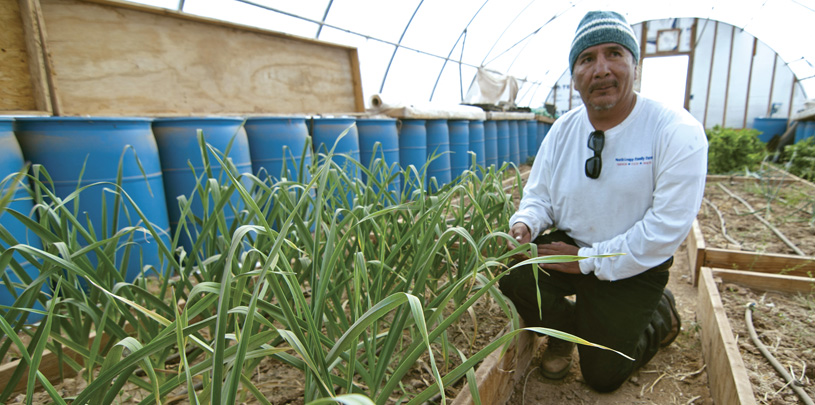
For nearly thirty years, North Leupp Family Farm, a sustainable community-based nonprofit located on the western edge of the Navajo reservation twenty-five miles east of Flagstaff, has worked to bring food security and economic development to this remote community.
Now, the farm has been awarded a competitive USDA grant that would allow it to explore growing beyond a subsistence operation to become a regional producer of milled blue corn. They’ve even found a buyer–Flagstaff-based manufacturer Local Alternative Inc. Jonathan Netzky, Local Alternative’s President, has agreed to buy tonnage of blue corn meal at a small premium, but first the farm must raise $13,134 in matching funds by December 1, 2014 or forfeit the grant.
“Milled blue corn sells for a much higher price than regular corn” says farmer and Chairman of the farm’s Board of Directors Stacey Jensen. “Right now, no one’s producing it in northern Arizona—it all has to be brought in from New Mexico.”
Using traditional farming practices, aided by solar power and drip irrigation, about thirty Navajo families tend small plots on the 100 acre farm, which also provides fresh vegetables to the Leupp STAR School, one of the first farm-to-school programs in Arizona. The farm is a model of sustainability and innovation on the Navajo reservation, where access to fresh produce is limited; the 18 million acre reservation (larger than Connecticut, Massachusetts, Rhode Island, Maryland, and Delaware combined) has only twelve supermarkets.
The farm would use the $26,268 USDA Value Added Grant funds to develop a business plan and feasibility study for 1) producing blue cornmeal from Navajo blue corn (a traditional crop also used in ceremonies); 2) building a solar-powered, portable coldstorage unit to reduce food waste and add value to harvested products; and 3) establishing a mobile market to increase its customer base.
“This is not just an opportunity for a new venture, it is an opportunity to utilize generations of traditional knowledge in farming and seasonal planning toward producing a product that is in demand in today’s business environment,” said mentor Jessica Stago of the Native American Business Incubator Network, who helped the farm apply for the USDA grant.
“Our farmers are feeding their families; if they have a little extra maybe they sell it at the side of the road, but a blue corn milling operation would take us to the next level, reducing the carbon footprint of the planet and bringing economic development to a population that needs a hand up rather than a hand out,” Jensen said. So far, Jensen and his collaborators have raised $4,620 in matching funds.
The Native American Business Incubator Network (NABIN), an initiative of the Grand Canyon Trust, has set up a donation page to help raise the remaining $8,514 cash match by the December 1, 2014 deadline. To make your tax-deductible donation, send a check to: North Leupp Family Farm Donation c/o Grand Canyon Trust, 2601 N. Ft. Valley Rd, Flagstaff, AZ 86001.
“Our region is constantly bombarded with economic development proposals that don’t align with the values of our communities and the region,” said Natasha K. Hale, Native America Program Manager for the Grand Canyon Trust. “But the farm is in a unique position to create a business model that helps strengthen both the regional food market and the local economy. This is a great social entrepreneurship model the community can support.”
Bears Ears petroglyph panels and cultural sites protected by new proposed management plan.
Read MoreA rally in Salt Lake City followed by a spiritual walk in White Mesa demonstrate the Ute community's determination to see uranium mill close.
Read MoreArizona Governor Katie Hobbs is the latest elected official to call for an environmental review of Pinyon Plain uranium mine.
Read More